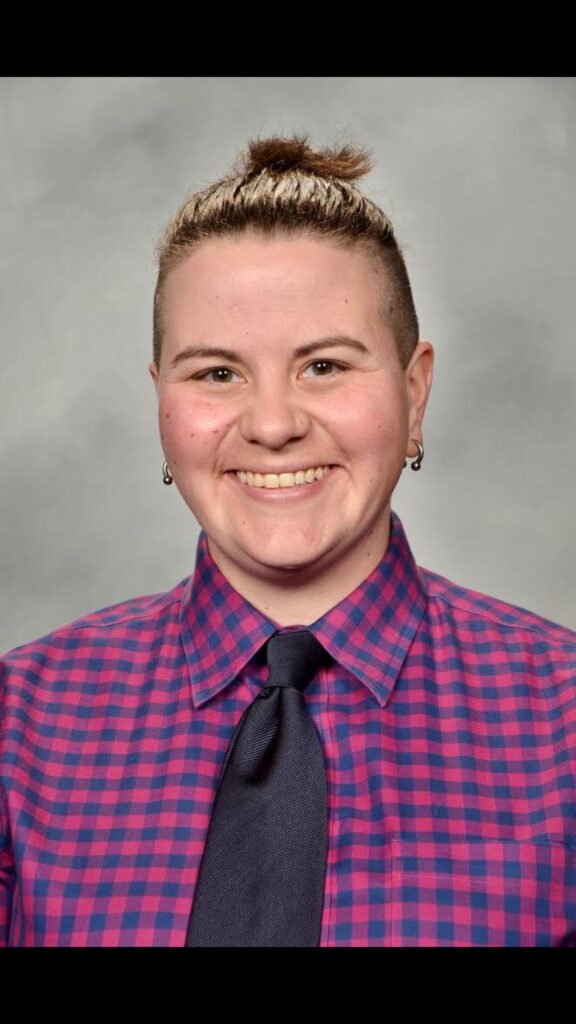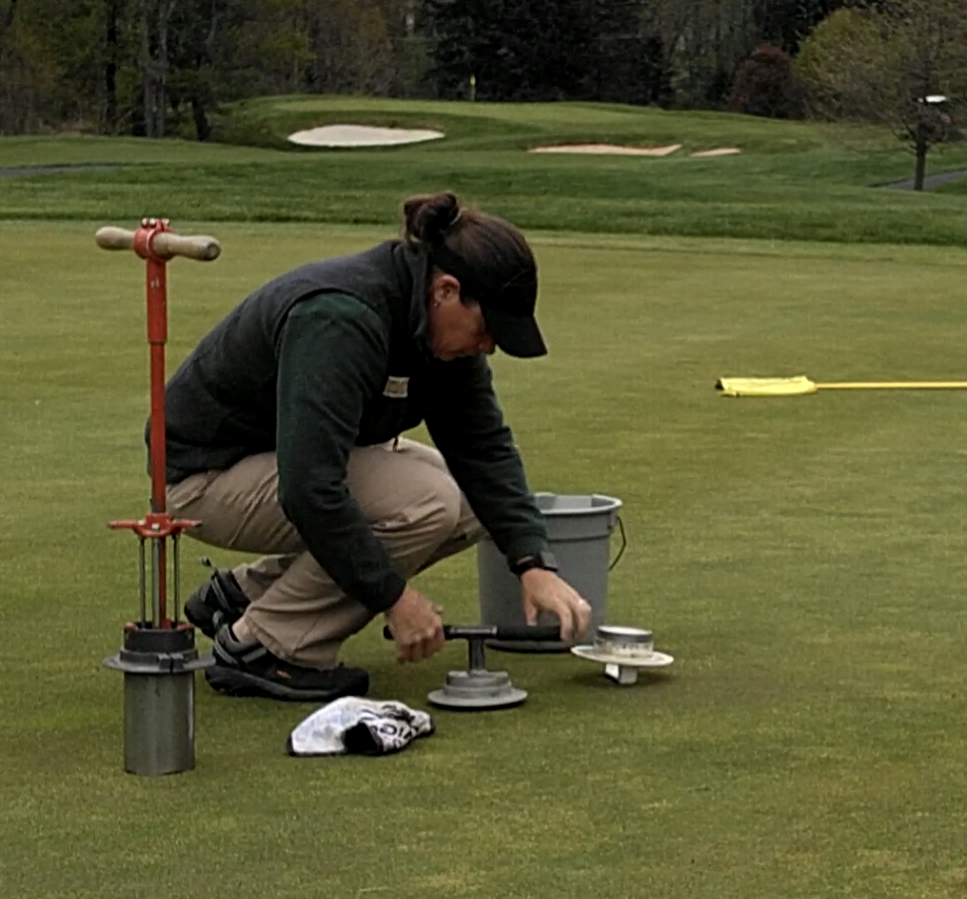Women Golf Course Superintendents


Women Superintendents
The Golf Course Superintendents Association of America reports it has 299 female members among its 18,500 members worldwide, or just over 1.5 percent. That includes 61 female superintendents (Class A and B) — 54 in the U.S., three in Canada and one each in Malaysia, Singapore, South Africa and South Korea. Although still a small percentage, that number has grown since first being counted in 1990. And, only about half of all course superintendents in America are members of the Association, so the overall number of women in the role is likely higher.


As a youngster, Renee Geyer loved mowing lawns. Later, she decided she wanted to mow bigger lawns, i.e. as at a golf course. That led to the pursuit of a career in agronomy, eventually becoming one of a growing number of women breaking through what might be termed the grass ceiling.
“Golf course maintenance was a way for me to combine a love of the game with a love of the outdoors,” said Geyer, superintendent at Canterwood Golf and Country Club in Washington. “I was a late-in-life turf student, but it made complete sense to me once I realized that it was a viable career and something I knew I could accomplish.”
So “for a lot of reasons”, both personal and professional, Geyer decided that after three years of college she would transition into a completely different major from vocal music education and vocal performance. “It was when I realized that I needed to find my happiness and to live for myself that I found the turf industry. I had played golf as a teenager and loved mowing lawns around my neighborhood in my hometown.”


Jill Seymour, superintendent at Charleston Springs Hill Golf Course in New Jersey, had worked on a golf course for the summer and also fell in love….with agronomy that is. “I loved working outside, seeing the sunrise, the hours and the actual work.” She worked at Penn State University’s Valentine Turfgrass Research Facility “where it all began while concurrently earning a Bachelors in Turfgrass.
Said Seymour, “I had previously been in school earning a psychology degree but once I found out about this field I jumped at the chance to try it out. I enjoyed working with my hands, prepping the course for play for the golfers. I was doing course set up within my first week. The super kept throwing different jobs at me and I can’t remember a single one that I disliked. I was instantly hooked. I’d finally found it!”
Laurie Bland, superintendent at Miami Springs Golf and Country Club in Florida was aware that there weren’t many women in the golf course industry and felt there was a lot of room for growth and new challenges if she went after turf management as a career. Her decision didn’t initially bring standing applause from family and friends.
Related: Why Hire a Golf Course Management Company?
“No one in my family or friends really understood why I would go down this path, but once they saw all that I was up too, they came around and thought it was cool.’ Working in turf management might not be for everyone, said Bland. “It could be difficult task on your home/family life. You have to find a balance and always surround yourself with a great support system, both at work and at home. I was very fortunate from early on while attending college that I surrounded myself with great mentors who always checked in with me and made sure I was doing okay and being respected.”
Blend’s advice to women?
“Just simply try it out, if it is not for you at least you learn something new along the way.” She has found support among peers. “In the last 17 years of being in this industry I have worked for and with a lot of men, all with vastly different cultural backgrounds, nationalities, and languages. None of them have ever said I wish you were a man. Although, I’m sure there are a few folks out there who probably still think that it is a `man’s job’; they probably haven’t met a female superintendent yet.”
Laurie Frutchey, superintendent at Rosedale Golf and Country Club in Florida has found her career as a golf course superintendent to be both very rewarding and exasperating. “The pride I take in my work is what keeps me going day to day. On those days when some things are not as great as you hoped, you take a deep breath and wait for the next day. When things are as perfect as possible at the end of the day, you leave with a smile at a job well done. Those are the days that keep me coming back.”
Frutchey worked part time at her college town’s golf course and also “loved every aspect of the job.” She continued, “As I progressed through the field and learned all of the duties of a golf course superintendent, I felt at home. I was never questioned as to why I chose this career. My parents were very understanding, especially after they had paid for my teaching degree, as long as I was happy.”
Related: Golf Course Architects, Builders, and Superintendents are “Triad” for Successful Bunkers
Frutchey has had “great experiences” with the mentors she has had, the events she has supervised, the friends she has made, the places she has been employed at and the beauty she has witnessed in nature. She believes more women can be exposed to the possibility of making golf course maintenance a career. “Perhaps women can be inspired through leadership. Knowing others have accomplished the role and are being proactive in recruitment, even with first time hires. I’m hoping throughout my career, I may have changed a few minds of this being a man’s job. If I’ve ever felt discrimination it was not from my colleagues.”
Frutchey opined, “I have always felt that more women aren’t in the industry because they simply don’t know that this is a career path. After all, our goal as superintendents is to get the majority of the work done on the course before golfers arrive, which means that we aren’t seen very much. More women are asking questions about course maintenance, which means that awareness of the career is increasing.”
Geyer said, “There are many things about this business that people automatically assume it is a `man’s job’. But the finesse that women can bring to the table is a great asset in many ways to either running a golf course or being a part of the maintenance team in some capacity. It is so much about visibility. If women don’t see other women in this line of work, then they don’t think that it is an option for them. You have to see it, then you can be it.”
Realted: Superintendent to General Manager
Geyer views the fact that a greater number of women looking into agronomy as a career as a “great step forward”. She continued, “It’s all about visibility, and an understanding that this is a viable career for women. After having met a small group of industry women back in 2019 at an event, the circle just continued to grow. We now know that each other exists, we support each other when we can, and are aware that by us doing what we love to do it may inspire a young woman to go into this field. Social media is one way we keep in touch, and it is great that others can get glimpses into what we do for a living.”
Seymour said, “When young women and girls see us out there preparing the course…..they might think `Hey…that looks interesting!’ Especially when they see the friendships and camaraderie between the women doing the work.”
Shelia Finney, Senior Director of Member Programs for the Golf Course Superintendents Association of America, pointed to her group’s involvement with youth organizations such as the National FFA, as increasing awareness of career opportunities in the turfgrass industry. The group’s First Green introduces young students to careers through a STEM education field trip to a golf course.
“I feel that the most important thing that GCSAA can do for our female members is provide the platform and resources for them to be able to connect with each other,” said Finney, “The reality is that they are spread out across the country and sometimes don’t even know each. When they are able to connect, the support network that is created is vital to creating a community where they can thrive as turfgrass professionals. Of course, all our members support each other through the overall community. This creates another network that provides lifelong friendships and support systems.”
Related: Tennessee Turfgrass Association Member Spotlight on Shelia Finney
At the group’s conference and tradeshow there is a yearly panel discussion that centers on women. “Everyone is invited to this event, not just women,” said Finney. “The Ladies Leading Turf panel has a different focus each year and there is a networking reception following that is heavily attended. It’s been exciting to see this event grow each year.”
The organization held its first ever GCSAA Women’s Task Group meeting this year at its headquarters in Lawrence, Kansas. “There was a great deal of brainstorming on how to encourage more women to choose the turfgrass industry as a career track,” said Finney. “The task group will be diving into how to create even more opportunities and resources for connection, growth and career success.
Geyer offered some advice to those women considering a career in agronomy, “It isn’t always glamorous, and it certainly isn’t always easy, but it is so gratifying once you achieve a goal that you have set out for yourself, or when your team accomplishes something incredibly worthwhile. Taking positive steps forward doesn’t happen every day, but once you conquer an obstacle it makes you want to achieve more. That is the kind of business/career this is.”
Recent Posts
The Rare Condor: What It Means for Golf and the Course Maintenance Behind It
Imagine this: you're on a par-5, having just hit your second shot toward the green.…
DENIOS Under Bench Cabinet Provides Safe Storage of Lithium-Ion Batteries
DENIOS introduces asecos under bench cabinets for the safe storage of undamaged lithium-ion batteries. They…
True Blue Golf Club, One of America’s Top 100 Resort Courses, Acquires Steve Dresser Golf Academy
True Blue Golf Club has acquired the Steve Dresser Golf Academy, a renowned instructional facility…
Memphis Country Club: A Golfer’s Study in Precision and Tradition
If you have ever teed it up at Memphis Country Club, you know this isn’t…
Superintendents Online Turf Directory – EVERYTHING TURF
Our online directory, directory.GolfCourseTrades.com is the go-to resource for the busy superintendent. It is your opportunity…
Foley Company attains GCSAA Silver Partner Status
Foley Company, a leader in turf equipment innovation and technology, affirms its support of the…


